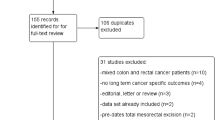Abstract
Background
Whether anastomotic leakage (AL) has a negative impact on survival remains a matter of debate. This study aimed to assess the impact of AL on the overall and disease-free survival of patients undergoing curative resection of stages 1–3 rectal cancer using propensity-scoring methods.
Methods
In a single-center study, 570 patients undergoing curative resection of stages 1–3 rectal cancer between January 2002 and December 2011 were assessed. The mean follow-up period was 4.7 ± 2.9 years. Patients who did and did not experience AL were compared using Cox regression and propensity score analyses.
Results
Overall, 51 patients (8.9 %) experienced an AL. The characteristics of the patients were highly biased concerning AL (propensity score, 0.16 ± 0.12 vs. 0.09 ± 0.07; P < 0.001). Anastomotic leakage was uniformly associated with a significantly increased risk of mortality in unadjusted analysis [hazard ratio (HR) 2.30; 95 % confidence interval (CI) 1.40–3.76; P = 0.003], multivariable Cox regression (HR 2.27; 95 % CI 1.33–3.88; P = 0.005), and propensity score-adjusted Cox regression (HR 2.07; 95 % CI 1.21–3.55; P = 0.014). Similarly, disease-free survival was significantly impaired in patients who experienced AL according to unadjusted analysis (HR 1.88; 95 % CI 1.19–2.95; P = 0.011), multivariable Cox regression (HR 1.90; 95 % CI 1.17–3.09; P = 0.014), and propensity score-adjusted Cox regression (HR 2.31; 95 % CI 1.40–3.80; P = 0.002).
Conclusions
This is the first propensity score-based analysis providing evidence that oncologic outcome may be impaired after curative rectal cancer resection in patients with AL.

Similar content being viewed by others
References
Mirnezami A, Mirnezami R, Chandrakumaran K, Sasapu K, Sagar P, Finan P. Increased local recurrence and reduced survival from colorectal cancer following anastomotic leak: systematic review and meta-analysis. Ann Surg. 2011;253:890–9.
Smith JD, Paty PB, Guillem JG, Temple LK, Weiser MR, Nash GM. Anastomotic leak is not associated with oncologic outcome in patients undergoing low anterior resection for rectal cancer. Ann Surg. 2012;256:1034–8.
Rahbari NN, Weitz J, Hohenberger W, et al. Definition and grading of anastomotic leakage following anterior resection of the rectum: a proposal by the International Study Group of Rectal Cancer. Surgery. 2010;147:339–51.
Ishwaran H, Kogalur UB, Blackstone EH, Lauer MS. Random survival forests. Ann Appl Stat. 2008;2:841–60.
Joffe MM, Rosenbaum PR. Invited commentary: propensity scores. Am J Epidemiol. 1999;150:327–33.
Rosenbaum PR. Model-based direct adjustment. J Am Stat Assoc. 1987;82:387–94.
Rosenbaum PR. Optimal matching for observational studies. J Am Stat Assoc. 1989;84:1024–32.
Rubin DB. Estimating causal effects from large data sets using propensity scores. Ann Intern Med. 1997;127(8 Pt 2):757–63.
Hansen BB, Klopfer SO. Optimal full matching and related designs via network flows. J Comput Graph Stat. 2006;15:609–27.
Sekhon JS. Multivariate and propensity score matching software with automated balance optimization: The Matching Package for R. J Stat Software. 2011;42:1–52.
den Dulk M, Marijnen CA, Collette L, et al. Multicentre analysis of oncological and survival outcomes following anastomotic leakage after rectal cancer surgery. Br J Surg. 2009;96:1066–75.
Aggarwal BB, Vijayalekshmi RV, Sung B. Targeting inflammatory pathways for prevention and therapy of cancer: short-term friend, long-term foe. Clin Cancer Res. 2009;15:425–30.
Mantovani A, Allavena P, Sica A, Balkwill F. Cancer-related inflammation. Nature. 2008;454:436–44.
Biagi JJ, Raphael MJ, Mackillop WJ, Kong W, King WD, Booth CM. Association between time to initiation of adjuvant chemotherapy and survival in colorectal cancer: a systematic review and meta-analysis. JAMA. 2011;305:2335–42.
Des Guetz G, Nicolas P, Perret GY, Morere JF, Uzzan B. Does delaying adjuvant chemotherapy after curative surgery for colorectal cancer impair survival? A meta-analysis. Eur J Cancer. 2010;46:1049–55.
Ulrich AB, Seiler C, Rahbari N, Weitz J, Buchler MW. Diverting stoma after low anterior resection: more arguments in favor. Dis Colon Rectum. 2009;52:412–8.
Chen J, Wang DR, Yu HF, Zhao ZK, Wang LH, Li YK. Defunctioning stoma in low anterior resection for rectal cancer: a meta-analysis of five recent studies. Hepatogastroenterology. 2012;59:1828–31.
Huser N, Michalski CW, Erkan M, Schuster T, Rosenberg R, Kleeff J, Friess H. Systematic review and meta-analysis of the role of defunctioning stoma in low rectal cancer surgery. Ann Surg. 2008;248:52–60.
Tan WS, Tang CL, Shi L, Eu KW. Meta-analysis of defunctioning stomas in low anterior resection for rectal cancer. Br J Surg. 2009;96:462–72.
Dickman PW, Adami HO. Interpreting trends in cancer patient survival. J Intern Med. 2006;260:103–17.
Sarfati D, Blakely T, Pearce N. Measuring cancer survival in populations: relative survival vs cancer-specific survival. Int J Epidemiol. 2010;39:598–610.
Tarantino I, Achermann P, Guller U, et al. Relative survival is an adequate estimate of cancer-specific survival: baseline mortality-adjusted 10-year survival of 771 rectal cancer patients. Ann Surg Oncol. 2013;20:3877–84.
Chua YJ, Sargent D, Cunningham D. Definition of disease-free survival: this is my truth—show me yours. Ann Oncol. 2005;16:1719–21.
Conflict of Interest
There are no conflicts of interest.
Author information
Authors and Affiliations
Corresponding author
Rights and permissions
About this article
Cite this article
Kulu, Y., Tarantio, I., Warschkow, R. et al. Anastomotic Leakage Is Associated with Impaired Overall and Disease-Free Survival after Curative Rectal Cancer Resection: A Propensity Score Analysis. Ann Surg Oncol 22, 2059–2067 (2015). https://doi.org/10.1245/s10434-014-4187-3
Received:
Published:
Issue Date:
DOI: https://doi.org/10.1245/s10434-014-4187-3




